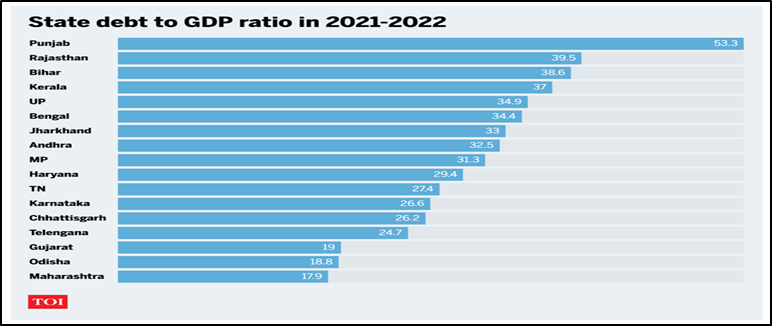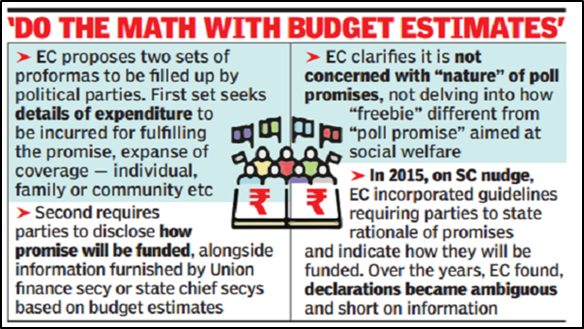In News:
- The Election Commission has proposed amending the model code to ask political parties to provide authentic information to voters on the financial viability of their poll promises.
- In a letter to all recognised national and state parties, the Election Commission (EC) asked them to submit their views on the proposals by October 19.
- The EC will release new guidelines once the consultations with the parties are over.
What’s in today’s article:
- Background (About poll promises, freebies)
- RBI’s report on state finances
- News Summary (MCC, Working, etc.)
Background:
- Recently, Prime Minister Narendra Modi had expressed concerns over giving free government schemes to the public on behalf of the states.
- The PM said that this culture of giving freebies is dangerous for the development of the country.
- The Supreme Court also recently observed that the issue concerning freebies is an important one and requires debate.
About Election Freebies:
- Provision of free electricity, free water, free public transport, waiver of pending utility bills and farm loan waivers are often regarded as freebies.
- Such waivers potentially undermine credit culture, distort prices through cross-subsidisation eroding incentives for private investment and disincentivise work at the current wage rate leading to a drop in labour force participation.
- As per estimates, expenditure on freebies range from 0.1 – 2.7 per cent of GSDP for different states.
RBI’s report on state finances:

- A report by the RBI titled “State Finances: A Risk Analysis” highlighted that the fiscal health of states like West Bengal, Kerala, Punjab, Rajasthan and Andhra Pradesh warrant a careful assessment because of their larger focus on social welfare.
- Punjab is expected to be worst hit as its debt-GSDP ratio has already exceeded 50% in 2021-22.
- The state government has started giving 300 units of free electricity from September 1 to every household.
- Rajasthan, Kerala and Bihar have already exceeded debt-GSDP ratio of 35%.
- For the five most indebted states – Punjab, Rajasthan, Bihar, Kerala and West Bengal – the RBI said that the debt stock is no longer sustainable as the debt growth outpaced their GSDP growth in the last five years.
News Summary:

- The Election Commission has proposed changes to its manifesto guidelines under the model code of conduct regarding poll promises, requiring political parties to specify how they would find resources for implementation of the pledges.
- This is likely to escalate the ongoing debate on the accountability of political parties in announcing freebies.
- The EC wants political parties to specify the estimated impact on financial stability, and the number of beneficiaries expected to be targeted by schemes promised.
- The EC has said that the proposed disclosures about the promises and their implementation would help voters make informed choices.
Model Code of Conduct (MCC):
- The Model Code of Conduct (MCC) is a consensus document.
- In other words, political parties have themselves agreed to keep their conduct during elections in check, and to work within the Code.
- The Election Commission first effectively put to use the Model Code of Conduct in the year 1991 to ensure fair elections and a level playing field.
- The Code comes into force as soon as the election schedule is announced, and stays in force until the election process is completed.
Is MCC legally enforceable?
- It is not a legally enforceable document, and the Election Commission usually uses moral sanction to get political parties and candidates to fall in line.
- The EC is now of the opinion that making the Code legally enforceable would be self-defeating because any violation must be responded to quickly — and this will not be possible if the matter goes to court.









